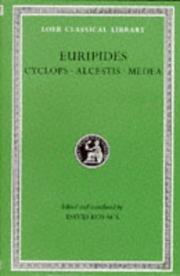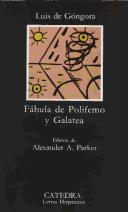| Listing 1 - 5 of 5 |
Sort by
|
Book
Year: 1841 Publisher: Paris: Imprimerie royale,
Abstract | Keywords | Export | Availability | Bookmark
 Loading...
Loading...Choose an application
- Reference Manager
- EndNote
- RefWorks (Direct export to RefWorks)
Book
ISBN: 9781316510513 9781108399999 9781108227148 1316510514 1108399991 Year: 2020 Publisher: Cambridge, United Kingdom New York, NY Cambridge University Press
Abstract | Keywords | Export | Availability | Bookmark
 Loading...
Loading...Choose an application
- Reference Manager
- EndNote
- RefWorks (Direct export to RefWorks)
"Euripides' Cyclops is the only example of Attic satyr-drama which survives intact. It is a brilliant dramatisation of the famous story from Homer's Odyssey of how Odysseus blinded the Cyclops after making him drunk. The play has much to teach us, not just about satyr-drama, but also about the reception and adaptation of Homer in classical Athens ; the brutal savagery of the Homeric monster is here replaced by an ironised presentation of Athenian social custom. Problems of syntax, metre and language are fully explained, and there is a sophisticated literary discussion of the play. This edition will be of interest to advanced undergraduates and graduate students studying Greek literature, as well as to scholars. The first full commentary on the play in English for four decades ; provides extensive linguistic help for student readers in particular ; the Introduction and Commentary provide a detailed account of the play considering textual, linguistic, historical and literary issues."--taken from publisher web site.
Classical Greek literature --- Cyclopes (Greek mythology) --- Euripides. --- Cyclopes (Greek mythology) - Drama --- Euripides. - Cyclops
Book
ISBN: 9781908343772 9781908343352 1908343354 190834377X Year: 2013 Volume: *9 Publisher: Oxford: Oxbow books,
Abstract | Keywords | Export | Availability | Bookmark
 Loading...
Loading...Choose an application
- Reference Manager
- EndNote
- RefWorks (Direct export to RefWorks)
Satirical plays --- Satire, Greek --- Satirical plays. --- Greek drama (Satyr play) --- Cyclopes (Greek mythology) --- Euripides --- Euripides, --- Satire, Greek - Translations into English

ISBN: 0674995600 9780674995604 Year: 1994 Volume: 9-12, 484, 495, 504, 506 Publisher: Cambridge (Mass.): Harvard university press,
Abstract | Keywords | Export | Availability | Bookmark
 Loading...
Loading...Choose an application
- Reference Manager
- EndNote
- RefWorks (Direct export to RefWorks)
Euripides (c. 485-406 BCE) has been prized in every age for his emotional and intellectual drama. Eighteen of his ninety or so plays survive complete, including Medea, Hippolytus, and Bacchae, one of the great masterpieces of the tragic genre. Fragments of his lost plays also survive.
Alcestis (Greek mythology) --- Cyclopes (Greek mythology) --- Medea (Greek mythology) --- Drama. --- Euripides --- Translations into English. --- Greek drama (Tragedy) --- Greek drama (Satyr play) --- Greek drama --- Mythology, Greek --- Mythology, Greek, in literature --- Tragedy --- Alcestis, --- Medea, --- Greek mythology --- Satyric drama, Greek --- Cyclops (Greek mythology) --- Μήδεια, --- Mēdeia, --- Ėvripid --- Yūrībīdīs --- Euripide --- Euripedes --- Eŭripido --- Eurypides --- Euripidesu --- אוריפידס --- エウリーピデース --- Εὐριπίδης --- Alceste, --- Alcestes, --- Alcesti , --- Alkestidė, --- Alcestis --- Alkēstis, --- Alkesto, --- Alkésztisz, --- 阿尔克斯提斯, --- Алкеста, --- Алкестида, --- アルケースティス, --- 알케스티스, --- Ἄλκηστις, --- Drama --- Greek literature --- Dionysia --- Giants --- Mythology --- Translations into English --- Alceste (Mythologie grecque) --- Cyclopes (Mythologie grecque) --- Tragédie grecque --- Médée (Mythologie grecque) --- Théâtre --- Traductions anglaises --- Alcestis (Greek mythology) - Drama --- Cyclopes (Greek mythology) - Drama --- Euripides - Translations into English --- Giants (Folklore) --- Greek drama. --- Mythology, Greek. --- Mythology, Greek, in literature. --- Tragedy.

ISBN: 843760379X 9788437603797 Year: 1987 Volume: 171 Publisher: Madrid: Ediciones Cátedra,
Abstract | Keywords | Export | Availability | Bookmark
 Loading...
Loading...Choose an application
- Reference Manager
- EndNote
- RefWorks (Direct export to RefWorks)
Polyphemus (Greek mythology) --- Galatea, sea nymph (Greek deity) --- Poetry --- Góngora y Argote, Luis de, --- -Galatea, sea nymph (Greek deity) --- -Galatea (Greek deity) --- Gongora y Argote, Luis de --- Cyclopes (Greek mythology) --- Galatea (Greek deity) --- Nymphs (Greek deities) --- Polyphemus (Greek mythology) - Poetry --- Galatea, sea nymph (Greek deity) - Poetry --- Góngora y Argote, Luis de, - 1561-1627 - Polifemo
| Listing 1 - 5 of 5 |
Sort by
|

 Search
Search Feedback
Feedback About UniCat
About UniCat  Help
Help News
News